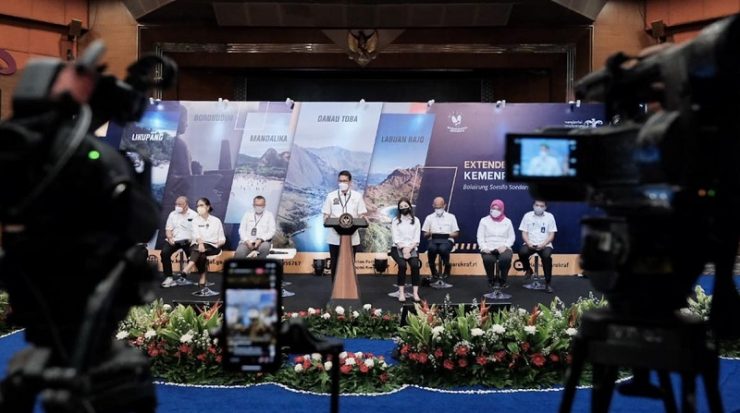MINISTER of Tourism and Creative Economy, Sandiaga Salahuddin Uno, in the “Extended Weekly Press Briefing” which was carried out in a hybrid manner from the Sapta Pesona Building Office of Ministry of Tourism & Creative Economy, Monday (3/5) afternoon said the free postage scheme would be run by the owner of the e-platform. commerce ahead of Eid as an effort to support the business of creative economy players.
“In the future, the technical implementation mechanism for free shipping (postage) will be implemented by the Ministry of Trade and run by e-commerce owners. This is a form of government activity in the midst of economic difficulties, the government has created this program which is implemented by the Ministry of Trade, which of course works with companies that own e-commerce platforms,” Sandiaga Uno said.
Furthermore, Sandiaga said that the free postage scheme was carried out as a form of compensation for the elimination of Lebaran homecoming. This is aimed at encouraging creative economy players to take advantage of creative economy product delivery opportunities. Given, it is not uncommon for the shipping cost to be more expensive than the price of the product, so postage subsidies are deemed necessary.
Meanwhile, regarding the expansion of the travel corridor arrangement in the tourism sector which allows return visits of foreign tourists. The return of these tourists is expected to be in line with the economic recovery, especially for areas that depend on the tourism sector and the creative economy, such as Bali Province.
“The Ministry of Tourism is encouraging the implementation of strict health protocols. and discipline in creative economy destinations and centers and the Ministry of Tourism and Creative Economy itself has published a guidebook for the implementation of Cleanliness, Health, Safety and Environmental Sustainability (CHSE) in destinations and various places as well as business fields in the tourism sector and the creative economy. This guide will continue to be disseminated to players in tourism and the creative economy,” he stated.
Sandiaga ensured that in the future the Ministry of Tourism would not only encourage and encourage the implementation of health protocols, but also ensure compliance. There will be a mechanism if they cannot comply (implementation of health protocols) will be warned, followed by fines. Coordinating with the local government, we also do not hesitate to recommend closing sanctions.
However, when asked about problems in the hotel industry which are increasingly uncertain due to the prohibition of homecoming by the Government, especially for hotels in the regions as well as the tariff war between these hotels due to the absence of a policy from the government regarding hotel rates according to star class. Sandiaga said that at the time of this pandemic, because purchasing power was also considered to be decreasing, it seemed that the hotel industry had difficulty raising rates.
Basic on data, occupancy of star hotels in Bali during March 2021 has improved compared to the condition of the previous month. However, this is not the case for non-star hotels, which actually recorded a decrease in occupancy. Room Occupancy Rate (ROR) of star hotels in March 2021 rose 1.25 points on a monthly basis or month to month (mtm) to 10.24%. ROR increases occurred in 1-star hotels, 4-star hotels and 5-star hotels. The rest, experienced a decrease in mtm.
Meanwhile according to Fadjar Hutomo, Deputy for Industry and Investment at Ministry of Tourism said however, regarding the tariff war in the hotel industry, we still leave it to the market. The Ministry has not yet made a policy regarding hotel rates according to its category, especially in this pandemic situation. The most important thing is industry lead, government only supports it,” he noted.
Fadjar added, during 2020 the average hotel occupancy rate in Indonesia only reached 34.30% or decreased compared to 2019 which reached 53.80%. I see hotels have already run a campaign to travel safely and made adaptations to the sale of accommodation packages during the COVID-19 pandemic. The packages offered a range of staycations, work from hotels, self-isolation packages, to meetings and marriages with an antigen swab test.
“I see the challenges faced by hotel and restaurant businesses during the pandemic are that there are still restrictions on the activities and movements of tourists through the Enforcement of Restrictions on Community Activities. This makes it difficult to estimate the occupancy rate this year. As a strategy to respond to this, the hotel tries to make the most of the workforce possible,” Fadjar Hutomo concluded. [traveltext.id]
















